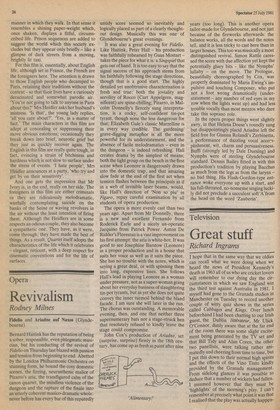Opera
Revivalism
Rodney Milnes
Fidelio and Ariadne auf Naxos (Glyndebourne) Bernard Haitink has the reputation of being a sober, responsible, even phlegmatic musician, but his conducting of the revival of Fidelio on Thursday last blazed with passion and tension from beginning to end. Abetted by the London Philharmonic Orchestra on stunning form, he bound the cosy domestic scenes, the fizzing, neurasthenic malice of Pizarro's aria, the transfigured calm of the canon quartet, the mindless violence of the dungeon and the rapture of the finale into an utterly coherent musico-dramatic whole: never before has every bar of this reputedly untidy score seemed so inevitably and logically placed as part of a clearly thoughtout design. Musically this was one of Glyndebourne's great evenings.
It was also a great evening for Fidelio. Like Haitink, Peter Hall his production was faithfully rehearsed by Guus Mostart takes the piece for what it is: a Sin gspiel that gets out of hand. It is too easy to say that the signal success of his approach stems from his faithfully following the stage directions, though that is a good start. The highly detailed yet unobtrusive characterisation is fresh and true: both the joviality and servility of Rocco (Curt Appelgren, magnificent) are spine-chilling; Pizarro, in Malcolm Donnelly's fiercely sung interpretation, is a cocky, self-confident tin-pot tyrant, though none the less dangerous for that; Elizabeth Gale's classic Marzelline is in every way credible. The gardening/ grave-digging metaphor is all the more powerful for its understatement, and the absence of facile melodramatics even in the dungeon is indeed refreshing. Hall creates drama by the simplest of means; both the tight group on the bench in the first scene when Leonore is dangerously drawn into the domestic trap, and that amazing slow fade at the end of the first act when tension flashes between the principals as if in a web of invisible laser beams, would, like Hall's direction of 'Non so piu' in Figaro, repay careful examination by all students of opera production.
The opera is more evenly cast than two years ago. Apart from Mr Donnelly, there is a new and excellent Fernando from Roderick Earle and a nicely un-operatic Jacquino from Patrick Power. Anton De Ridder's Florestan is a vast improvement on his first attempt: the aria is white-hot. It was good to see Josephine Barstow (Leonore) in a proper production and in a house that suits her voice as well as it suits the piece. She has no trouble with the notes, which is saying a great deal, or with spinning them into long, expressive lines. She follows Hall's lead in playing Leonore as a woman under pressure, not as a super-woman going about her everyday business of slaughtering tin-pot tyrants, but as yet she does not quite convey the inner turmoil behind the bland facade. I am sure she will later in the run. The chorus was outstanding. A memorable evening, then, and one that neither three supernumerary bats nor a stage-struck hen that resolutely refused to kindly leave the stage could compromise.
John Cox's production of Ariadne, set (surprise, surprise) firmly in the 18th century, has come up as fresh as paint after nine years (too long). This is another opera tailor-made for Glyndebourne, and not just because of the fireworks afterwards: the balance works, all the words and the notes tell, and it is less tricky to cast here than in larger houses. This too was musically a most distinguished revival. Simon Rattle caressed the score with due affection yet kept the potentially gluey bits like the Nymphs' lullaby on the move. The Prologue, beautifully choreographed by Cox, was properly dominated by Maria Ewing's impulsive and touching Composer, who put not a foot wrong dramatically (understatement any number of red eyes in my row when the lights went up) and had less trouble vocally than most mezzos who dare take this soprano role.
In the opera proper things went slightly awry, in that Helena Doese's roundly sung but disappointingly placid Ariadne left the field free for Gianna Rolandi's Zerbinetta, a performance of dazzling vocal acconplishment, wit, charm and persuasiveness. Buffi (strongly led by Dale Duesing) and Nymphs were of sterling Glyndebourne standard. Dennis Bailey fitted in with this production's tradition by playing Bacchus as much from the legs as from the larynx no bad thing. His Flash-Gordon-type entrance woke everyone up with a start, and his full-throated. no-nonsense singing luckily did not preclude a succulent soft 'A'from the head on the word 'Zauberin'.


































 Previous page
Previous page